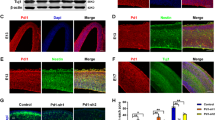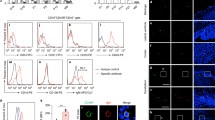Abstract
In early life, the immune system plays an essential role in brain development. In our study, the immunopotentiator thymosin alpha-1 (Ta1) was peripherally administered to neonatal mice to explore whether the peripheral immunopotentiator affects neurodevelopment and cognition, and to further investigate the relevant mechanism. Compared with the control group, the Ta1 mice displayed better cognitive abilities in early life. The numbers of 5-bromodeoxyuridine (BrdU)+, nestin+, T-box transcription factor 2 (Tbr2)+, BrdU+/doublecortin (DCX)+, BrdU+/ionized calcium-binding adaptor molecule 1 (Iba1)+, and BrdU+/neuronal nuclei (NeuN)+ cells in the hippocampus were increased in the Ta1 group, accompanied by increased interleukin-4 (IL-4), interferon-gamma, brain-derived neurotrophic factor, nerve growth factor, and insulin-like growth factor-1 as well as decreased IL-6 and tumor necrosis factor-α. Furthermore, the Ta1-group showed a Th1-polarized immune response, and the neurotrophic factors were positively associated with the Th1/Th2 ratio. More importantly, administration of Ta1 blocked lipopolysaccharide-induced impairment of hippocampal neurogenesis in early life. These findings suggest that peripheral Ta1 contributes to neurogenesis and cognition probably through a systemic Th1 bias, as well as neuroprotection against LPS infection by Ta1.







Similar content being viewed by others
References
Yirmiya R, Goshen I. Immune modulation of learning, memory, neural plasticity and neurogenesis. Brain Behav Immun 2011, 25:181–213.
Ziv Y, Ron N, Butovsky O, Landa G, Sudai E, Greenberg N, et al. Immune cells contribute to the maintenance of neurogenesis and spatial learning abilities in adulthood. Nat Neurosci 2006, 9: 268–275.
Ziv Y, Schwartz M. Immune-based regulation of adult neurogenesis: implications for learning and memory. Brain Behav Immun 2008, 22: 167–176.
Kipnis J, Cohen H, Cardon M, Ziv Y, Schwartz M. T cell deficiency leads to cognitive dysfunction: implications for therapeutic vaccination for schizophrenia and other psychiatric conditions. Proc Natl Acad Sci U S A 2004, 101: 8180–8185.
Bilbo SD. Early-life infection is a vulnerability factor for aging-related glial alterations and cognitive decline. Neurobiol Learn Mem 2010, 94: 57–64.
Ron-Harel N, Segev Y, Lewitus GM, Cardon M, Ziv Y, Netanely D, et al. Age-dependent spatial memory loss can be partially restored by immune activation. Rejuvenation Res 2008, 11: 903–913.
Schwartz M, London A, Shechter R. Boosting T-cell immunity as a therapeutic approach for neurodegenerative conditions: the role of innate immunity. Neuroscience 2009, 158: 1133–1142.
Zhang Y, Saito H, Nishiyama N. Thymectomy-induced deterioration of learning and memory in mice. Brain Res 1994, 658: 127–134.
Yang S, Liu ZW, Zhou WX, Zhang YX. Thymosin alpha-1 modulates excitatory synaptic transmission in cultured hippocampal neurons in rats. Neurosci Lett 2003, 350: 81–84.
Karrow NA. Activation of the hypothalamic-pituitary-adrenal axis and autonomic nervous system during inflammation and altered programming of the neuroendocrine-immune axis during fetal and neonatal development: lessons learned from the model inflammagen, lipopolysaccharide. Brain Behav Immun 2006, 20: 144–158.
Bilbo SD, Schwarz JM. Early-life programming of later-life brain and behavior: a critical role for the immune system. Front Behav Neurosci 2009, 3:14.
Bilbo SD, Schwarz JM. The immune system and developmental programming of brain and behavior. Front Neuroendocrinol 2012, 33: 267–86.
Bland ST, Beckley JT, Young S, Tsang V, Watkins LR, Maier SF, et al. Enduring consequences of early-life infection on glial and neural cell genesis within cognitive regions of the brain. Brain Behav Immun 2010, 24: 329–338.
Järlestedt K, Naylor AS, Dean J, Hagberg H, Mallard C. Decreased survival of newborn neurons in the dorsal hippocampus after neonatal LPS exposure in mice. Neuroscience 2013, 253: 21–28.
Bilbo SD, Rudy JW, Watkins LR, Maier SF. A behavioural characterization of neonatal infection-facilitated memory impairment in adult rats. Behav Brain Res 2006, 169: 39–47.
Spencer SJ, Heida JG, Pittman QJ. Early life immune challenge—effects on behavioural indices of adult rat fear and anxiety. Behav Brain Res 2005, 164: 231–238.
Walker FR, Hodyl NA, Krivanek KM, Hodgson DM. Early life host-bacteria relations and development: long-term individual differences in neuroimmune function following neonatal endotoxin challenge. Physiol Behav 2006, 87: 126–134.
Yang J, Qi F, Gu H, Zou J, Yang Y, Yuan Q, et al. Neonatal BCG vaccination of mice improves neurogenesis and behavior in early life. Brain Res Bull 2016, 120: 25–33.
Htain WW, Leong SK, Yuen R, Ling EA. Effects of thymosin alpha1 on the development of amoeboid microglial cells in the corpus callosum of neonatal BALB/c and athymic mice. Brain Res 1997, 755: 63–73.
Saitoh A, Ohashi M, Suzuki S, Tsukagoshi M, Sugiyama A, Yamada M, et al. Activation of the prelimbic medial prefrontal cortex induces anxiety-like behaviors via N-Methyl-D-aspartate receptor-mediated glutamatergic neurotransmission in mice. J Neurosci Res 2014, 92: 1044–1053.
Xu X, Zhou X, Zhou XW, Zhang Z, Liao MJ, Gao Q, et al. Schizandrin prevents dexamethasone-induced cognitive deficits. Neurosci Bull 2012, 28: 532–540.
Zhang N, Xing M, Wang Y, Liang H, Yang Z, Shi F, et al. Hydroxysafflor yellow A improves learning and memory in a rat model of vascular dementia by increasing VEGF and NR1 in the hippocampus. Neurosci Bull 2014, 30: 417–424.
Deng W, Aimone JB, Gage FH. New neurons and new memories: how does adult hippocampal neurogenesis affect learning and memory? Nat Rev Neurosci 2010, 11: 339–350.
Santarelli L, Saxe M, Gross C, Surget A, Battaglia F, Dulawa S, et al. Requirement of hippocampal neurogenesis for the behavioral effects of antidepressants. Science 2003, 301: 805–809.
Deverman BE, Patterson PH. Cytokines and CNS development. Neuron 2009, 64: 61–78.
Xing X, Sha S, Li Y, Zong L, Jiang T, Cao Y. Immunization with a new DNA vaccine for Alzheimer’s disease elicited Th2 immune response in BALB/c mice by in vivo electroporation. J Neurol Sci 2012, 313: 17–21.
Browne TC, McQuillan K, McManus RM, O’Reilly JA, Mills KH, Lynch MA. IFN-γ Production by amyloid β-specific Th1 cells promotes microglial activation and increases plaque burden in a mouse model of Alzheimer’s disease. J Immunol 2013, 190: 2241–2251.
Zhang Y, Zou J, Yang J, Yao Z. Aβ1-15-derived monoclonal antibody reduces more Aβ burdens and neuroinflammation than homologous vaccine in APP/PS1 mice. Curr Alzheimer Res 2015, 12: 384–397.
Yang J, Qi F, Yang Y, Yuan Q, Zou J, Guo K, et al. Neonatal hepatitis B vaccination impaired the behavior and neurogenesis of mice transiently in early adulthood. Psychoneuroendocrinology 2016, 73: 166–176.
Xia Y, Qi F, Zou J, Yang J, Yao Z. Influenza vaccination during early pregnancy contributes to neurogenesis and behavioral function in offspring. Brain Behav Immun 2014, 42: 212–221.
Butovsky O, Ziv Y, Schwartz A, Landa G, Talpalar AE, Pluchino S, et al. Microglia activated by IL-4 or IFN-gamma differentially induce neurogenesis and oligodendrogenesis from adult stem/progenitor cells. Mol Cell Neurosci 2006, 31: 149–160.
Fiore M, Angelucci F, Alleva E, Branchi I, Probert L, Aloe L. Learning performances, brain NGF distribution and NPY levels in transgenic mice expressing TNF-alpha. Behav Brain Res 2000, 112: 165–175.
Kohman RA, Bhattacharya TK, Kilby C, Bucko P, Rhodes JS. Effects of minocycline on spatial learning, hippocampal neurogenesis and microglia in aged and adult mice. Behav Brain Res 2013, 242: 17–24.
Heldt SA, Stanek L, Chhatwal JP, Ressler KJ. Hippocampus-specific deletion of BDNF in adult mice impairs spatial memory and extinction of aversive memories. Mol Psychiatry 2007, 12: 656–670.
Korte M, Carroll P, Wolf E, Brem G, Thoenen H, Bonhoeffer T. Bonhoeffer, Hippocampal long-term potentiation is impaired in mice lacking brain-derived neurotrophic factor. Proc Natl Acad Sci U S A 1995, 92: 8856–8860.
Conner JM, Franks KM, Titterness AK, Russell K, Merrill DA, Christie BR, et al. NGF is essential for hippocampal plasticity and learning. J Neurosci 2009, 29: 10883–10889.
Harada N, Zhao J, Kurihara H, Nakagata N, Okajima K. Desalted deep-sea water improves cognitive function in mice by increasing the production of insulin-like growth factor-I in the hippocampus. Transl Res 2011, 158: 106–117.
Hanisch UK, Kettenmann H. Microglia: active sensor and versatile effector cells in the normal and pathologic brain. Nat Neurosci 2007, 10: 1387–1394.
Ekdahl CT, Kokaia Z, Lindvall O. Brain inflammation and adult neurogenesis: the dual role of microglia. Neuroscience 2009, 158: 1021–1029.
He F, Zou JT, Zhou QF, Niu DL, Jia WH. Glatiramer acetate reverses cognitive deficits from cranial-irradiated rat by inducing hippocampal neurogenesis. J Neuroimmunol 2014, 271: 1–7.
Palumbo ML, Trinchero MF, Zorrilla-Zubilete MA, Schinder AF, Genaro AM. Glatiramer acetate reverts stress-induced alterations on adult neurogenesis and behavior. Involvement of Th1/Th2 balance. Brain Behav Immun 2012, 26: 429–438.
Acknowledgements
We thank Prof. Zhibin Yao for invaluable comments, as well as Qunfang Yuan for technical assistance. We also thank Prof. Libin Zhou for providing instruments. This work was supported by the Natural Science Foundation of Guangdong Province, China (2014A030310343, 2015A030313153, and 2016A030313253); the Medical Scientific Research Foundation of Guangdong Province, China (A2015382); the Doctoral Program of Guangzhou Medical University, China (2014C19).
Author information
Authors and Affiliations
Corresponding authors
Ethics declarations
Conflict of interest
We declare no conflict of interest.
Rights and permissions
About this article
Cite this article
Wang, G., He, F., Xu, Y. et al. Immunopotentiator Thymosin Alpha-1 Promotes Neurogenesis and Cognition in the Developing Mouse via a Systemic Th1 Bias. Neurosci. Bull. 33, 675–684 (2017). https://doi.org/10.1007/s12264-017-0162-x
Received:
Accepted:
Published:
Issue Date:
DOI: https://doi.org/10.1007/s12264-017-0162-x




